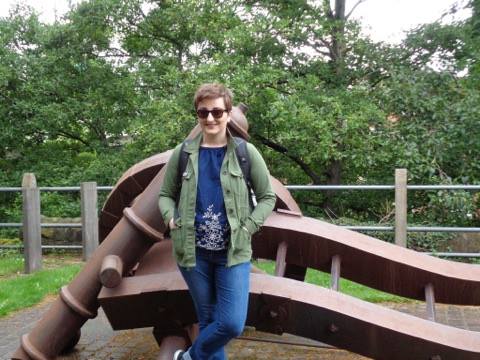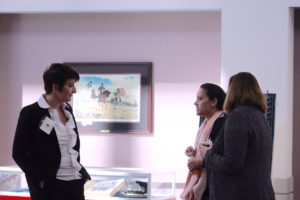
Heather pictured with a cannon (reproduction) that was used to defend the city of Chester (Personal Photo)
NHF Membership Spotlight is an ongoing segment for the Naval Historical Foundation blog where we showcase our loyal members. It’s important that we let our members know that they are as integral a part of naval history as the ships and sailors that continue to protect and serve today. If you are interested in becoming the next individual of our Membership Spotlight, please email Matthew Eng, NHF Digital Content Developer, at meng@navyhistory.org.
Our second Membership Spotlight is for Ms. Heather M. Haley, a recent student member of the Foundation, who took time out of her busy schedule at Auburn University to discuss her current research and the importance of naval history. She became a student member earlier this month and is the newest reviewer of our Naval History Book Review program. (FREE for qualifying students!).
Heather M. Haley: The Lone Student of Vietnam’s Irregular Warfare
A California native and graduate teaching fellow in the History Department at Auburn University, Heather M. Haley holds Bachelors and Masters degrees in History from Texas State University. She has a penchant for conducting oral histories including the initial research, interview process, and concluding transcription so that the inclusion of oral history creates a more thorough and personal documentation of historical events. Her Master’s thesis, entitled “Strategic Surprise: The Dispersal of Agent Orange in Vietnam and Korea in the late-1960s,” was well-received by The College of Liberal Arts, in part, due to the inclusion of such narratives and earned the Outstanding Master’s Thesis Award in the Humanities and Fine Arts.

Heather at the Violent Skies Conference (NHF Photo)
I first encountered Heather in 2015 during the Violent Skies Conference we helped put on at National Defense University. As part of the conference, the organizers provided a travel scholarship for graduate students who wanted to attend and present. Heather was the only one to take us on it. As luck would have it, she was on the panel I moderated on irregular warfare during the Vietnam Conflict. Although her paper on her Master’s thesis topic was well researched and presented, it had very little to do with the U.S. Navy. Perhaps with a little prodding in the right direction, I thought, I could get her to “convert” to studying naval history. At the banquet held at the conclusion of the conference in Crystal City, I had the opportunity to talk with Heather more about her research and writing in history. We resolved to remain in contact about her research and work, with a solemn promise to study more of the Navy in the future.
It seemed to work.
Heather’s current research interests involve naval history. At present, she focuses on the intersection of memory and identity among Navy personnel and endeavors to research race and gender dynamics aboard USS Enterprise for her dissertation. She anticipates numerous research trips to Washington, D.C. and will work closely with the Naval Historical Foundation to plan academic and public history curriculums that incorporate naval history as the means by which students can understand material culture, global communications, population growth, and economics.
Why is Naval History Important?
This is the question we will ask every NHF Member profiled in this series. It is important for members, readers, and prospective members to understand why these men and women help preserve naval history on a daily basis.
I come from a Navy family: my mum, my dad, my sister, and my husband. My interest in naval history undoubtedly grew from their experiences. While I never joined the service, I find that my research in nautical and naval histories brings me closer to them and furthers their legacies.
You can see her first review for our Naval History Book Reviews this week.


Ed Erdmann